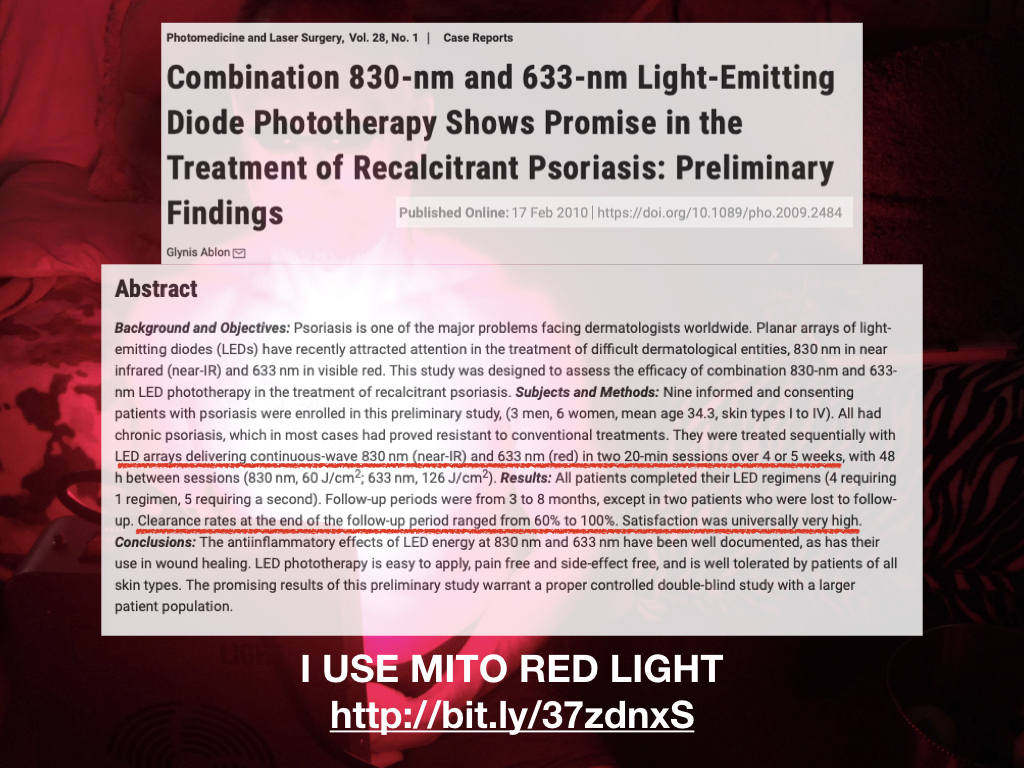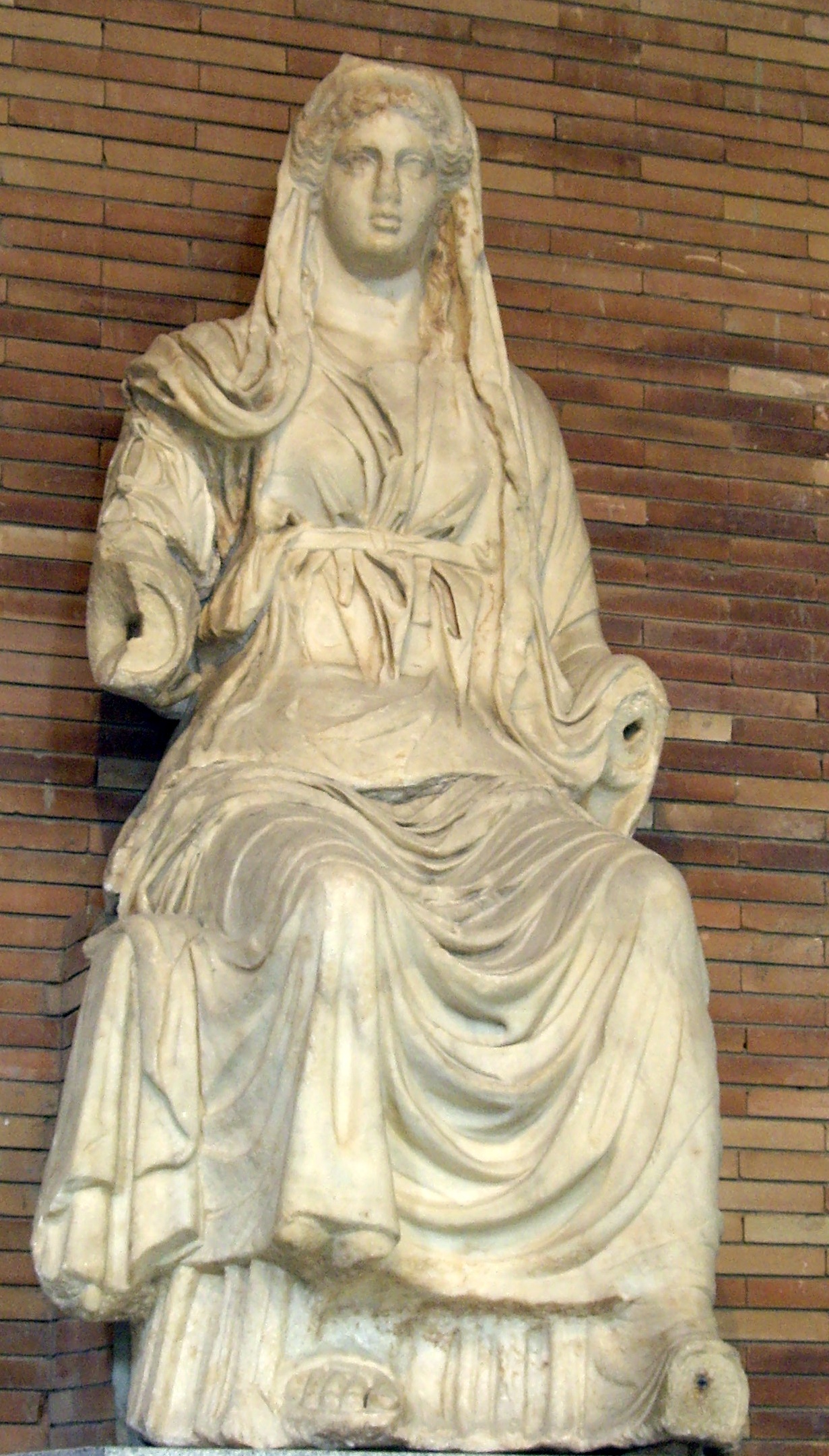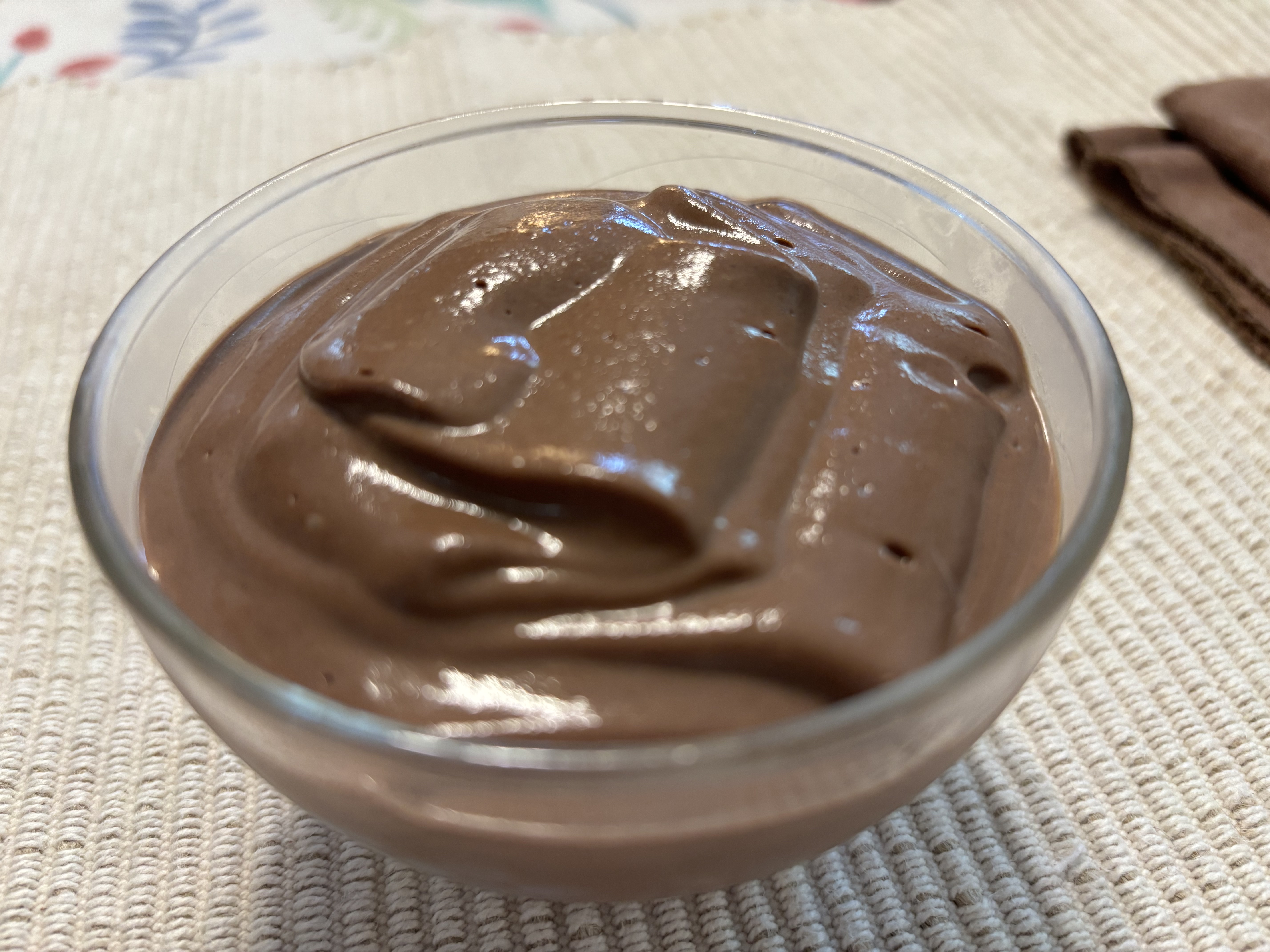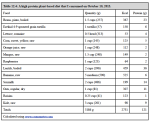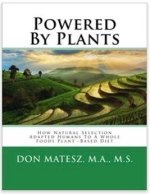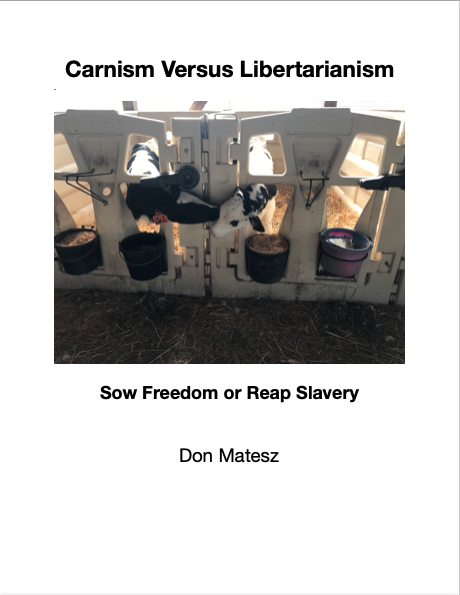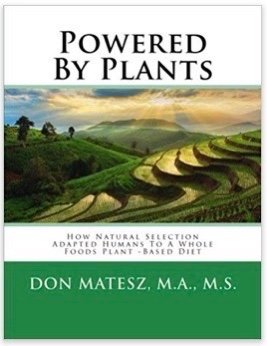How to Heal Psoriasis
With Functional Nutrition
I suffered with and searched for a natural way to heal psoriasis for more than 45 years before I discovered a way to dramatically improve my condition with functional nutrition and very simple herbal medicine .
Psoriasis Is A Liver and Bowel Disease
Physicians and patients alike generally regard psoriasis as a skin disease. However, in alignment with Chinese medical theory, modern clinical and experimental research suggests that psoriasis results from liver malfunction and bowel dysbiosis. These must be corrected to heal psoriasis.
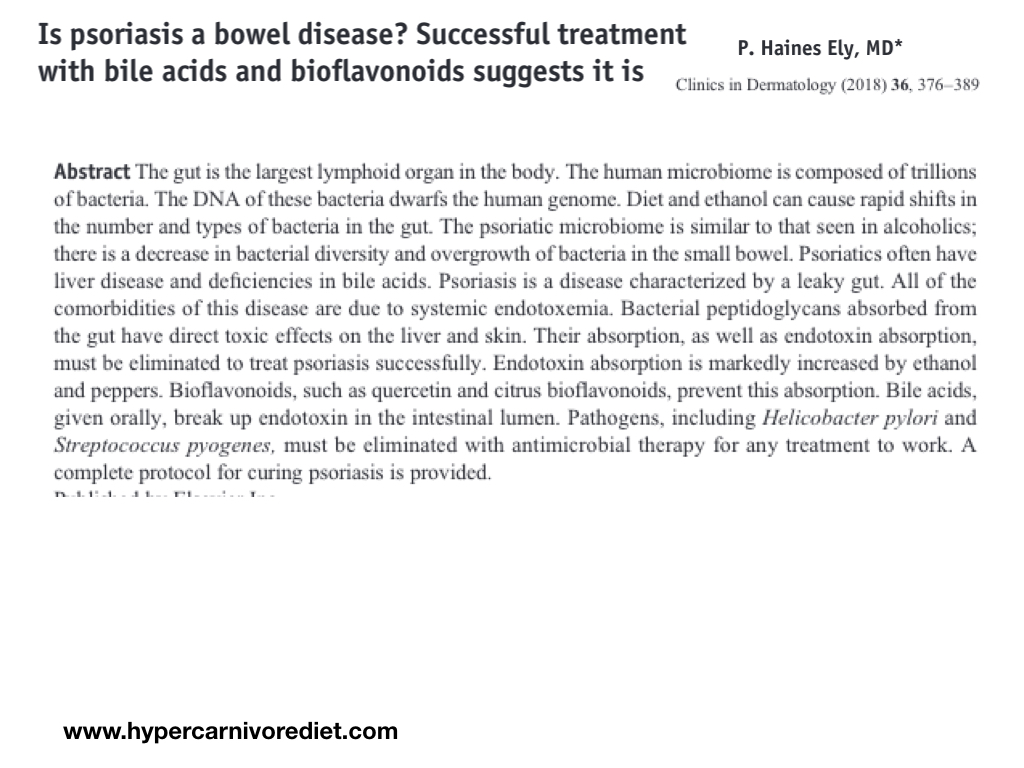
This 2018 report (above) published in Clinics in Dermatology reviewed research indicating that psoriasis patients typically have several common functional digestive system disorders, including:
- poor bile flow
- bacterial endotoxin in circulation
- small intestine bacterial overgrowth 79% of cases
- Strep pyogenes infection
- H. pylori or B. hominis infections in cases with pronounced itching
- liver malfunction or damage
- elevated levels of phosphoryl kinase in skin lesions
Dr. Ely explains a way to heal psoriasis naturally using diet and supplements that address these problems.
Heal Psoriasis Naturally
Based on research and his own clinical experience, the author of the paper, Dr. Ely, outlines a way to heal psoriasis, as shown in this flow chart from the paper:
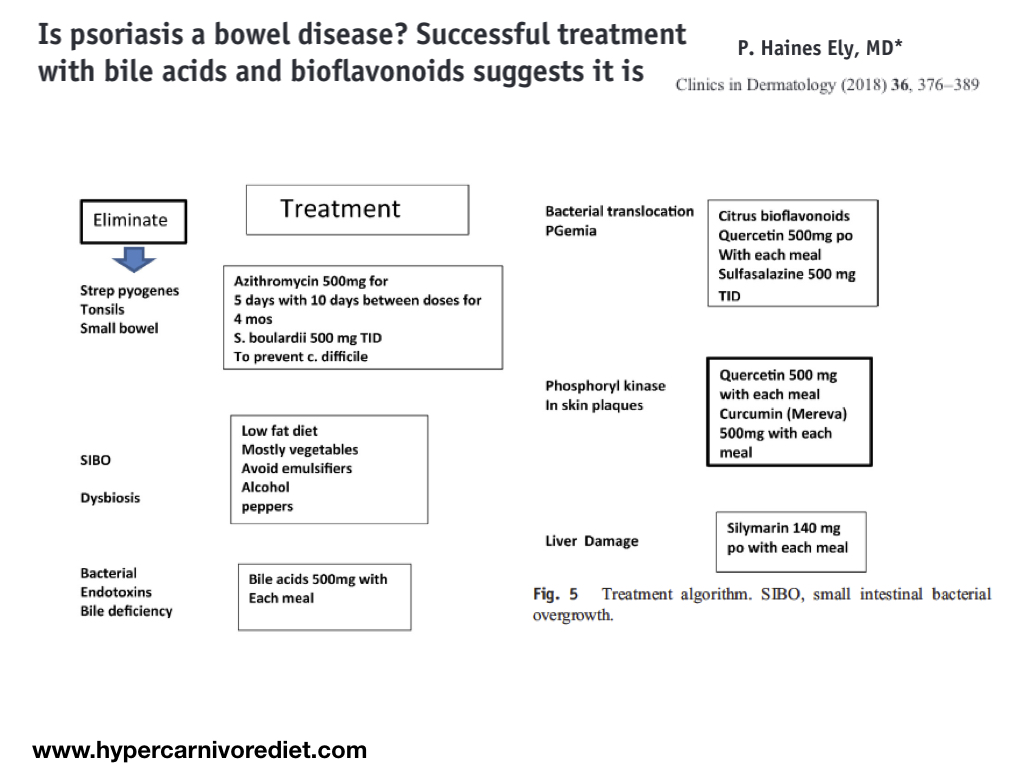
Eating to Heal Psoriasis
Based on basic microbiology and on my own experience, I disagree with Dr. Ely's prescription of a low-fat high-fiber diet. In my efforts to heal psoriasis over the past 4 decades, I have tried both low-fat plant-based and low-carbohydrate animal-based diets for treatment, as well as a number of herbal medicine protocols for improving liver health.
Regarding diet, I have by far gotten the best results to heal psoriasis by restricting indigestible but fermentable carbohydrates i.e. fiber.
Ely suggests that a low-fat diet will reduce the small intestine bacterial overgrowth (SIBO) found in many psoriasis patients, but a low-fat diet will very likely be high in resistant starches and fibers, which are the main foods for intestinal bacterias. Diets high in fermentable carbohydrates – particularly, resistant starches – increase intestinal bacteria growth, and those bacteria release the gasses that produce bloating and flatulence. Beans, peas and lentils are particularly well-known for this effect but vegetables (particularly cabbage family), grains (especially whole grains), breads, pastas, potatoes, seeds and nuts all contribute to bacterial growth, fermentation, gas, bloating and flatulence. These bacteria also produce acids that irritate and inflame the intestine.
In contrast, restricting intake of fermentable carbohydrates including fibers – by restricting whole grains, beans, vegetables, nuts and seeds – restricts intestinal bacteria growth and gets rid of bloating and flatulence. The result is less gut inflammation, which results in less absorption of bacterial endotoxin and less systemic and skin inflammation.
Chronic bloating and flatulence are the principle symptoms of intestinal bacteria overgrowth. When I ate low-fat high-fiber, high-carbohydrate diets I had ongoing gas, bloating and embarrassing flatulence. This was proof that the low-fat, high-carbohydrate diet INCREASED intestinal bacteria growth. That increased bacterial growth produced more gasses and acids that irritated my intestines. Only reducing my intake of high fiber starches reduced this problem.
If Ely is correct that SIBO contributes to psoriasis, then this explains why my skin worsened on a plant-based diet unless I took herbal medicines, and also why herbal medicines were only partially effective – the plant-based diets were countering the beneficial effect of the herbal medicines.
These photos show how the psoriasis lesions in my ears improved in 18 months by eating a whole foods animal-based hypercarnivore diet, rich in meat, milk products and eggs but limited in starch, sugar and fiber from plants, and using only artichoke extract to promote liver and gallbladder function:
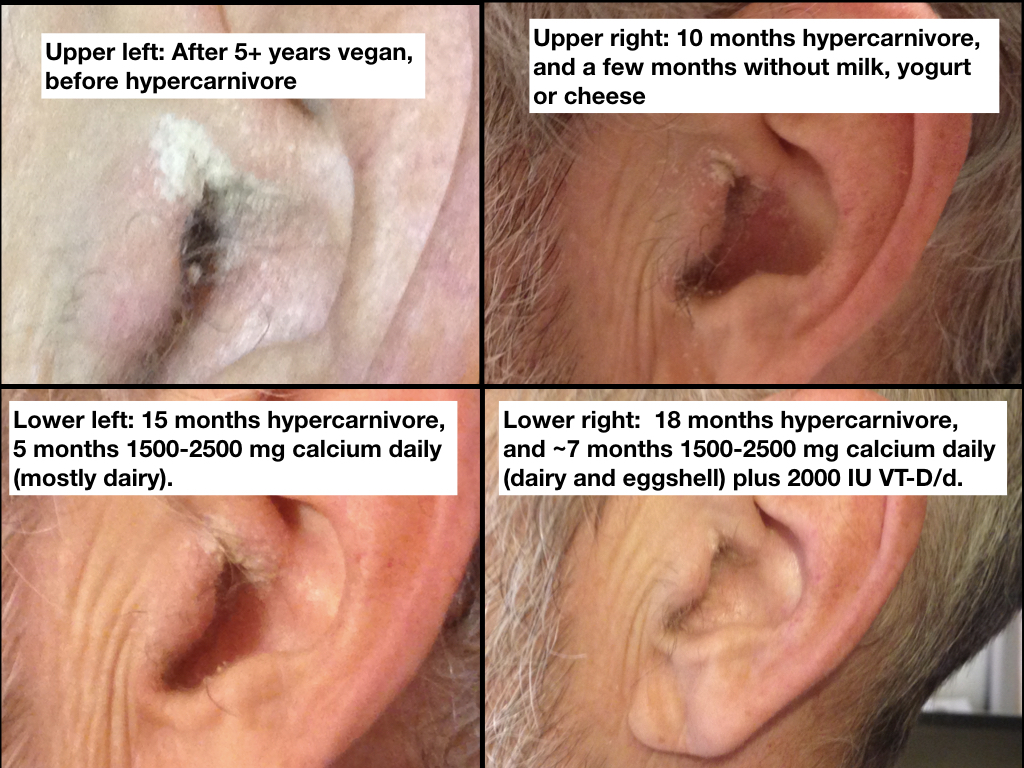
The upper left photo was taken after 5 years on a low-fat whole foods plant-based vegan diet. The dramatic improvement I saw eating a whole-foods animal-based diet led me to write The Hypercarnivore Diet.
However, I did not get full resolution and had some scalp lesions that did not improve much even by 24 months. I also had a major problem with muscle cramping due to potassium deficiency when eating at least 90% animal-based, unless I included potassium citrate supplements.
To end the cramping complication without relying on potassium supplements, I restored high potassium fruits to my diet while reducing total and saturated fat intake. I found additional benefit for my skin by a moderate fat Meats & Sweets approach and following Dr. Ely's suggested supplement protocol.
Saturated Fats And Psoriasis
Experiments show that a high fat, high saturated fat diet promotes inflammation that occurs in psoriasis skin.
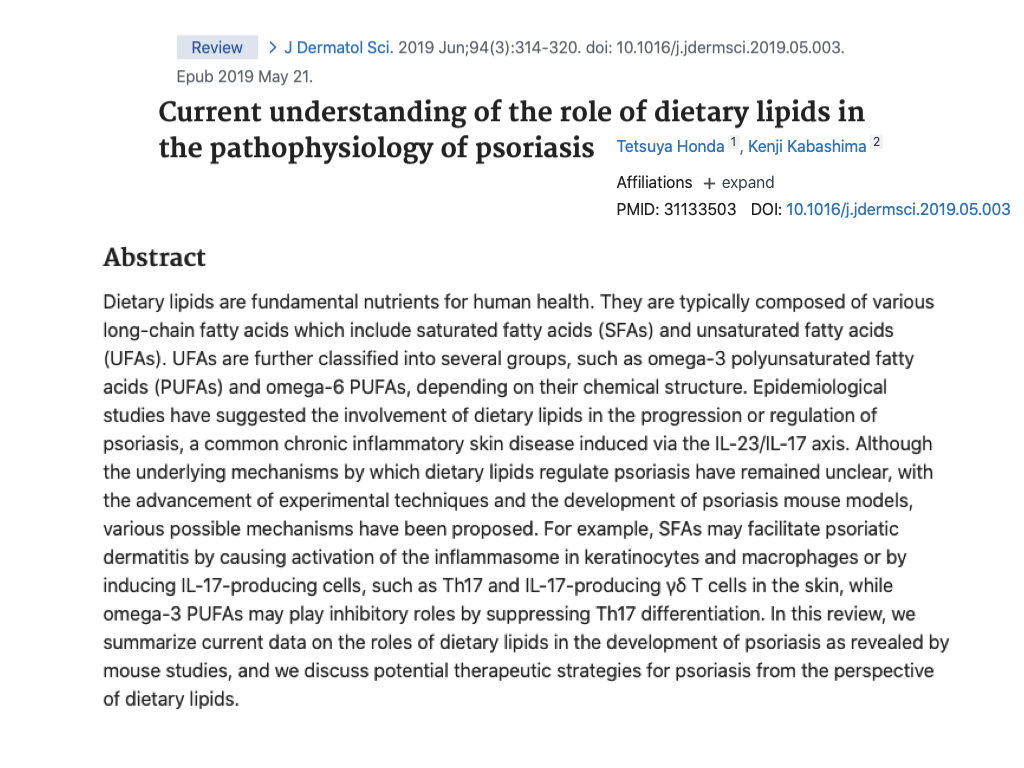
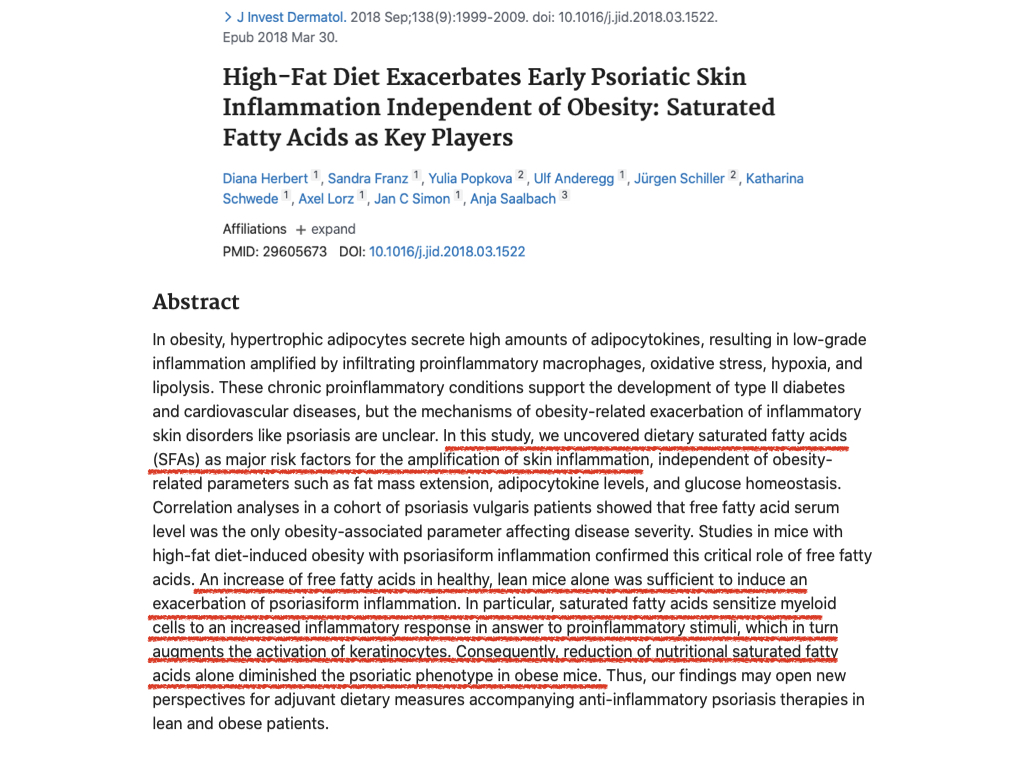
I found my condition improved when I reduced total and saturated fat intake by eating leaner meats (trimming visible fat off beef) or reduced fat dairy products. Besides increasing skin inflammation, higher fat intake increases demand for bile.
Bile Acids for Psoriasis
Chinese medicine has for hundreds of years used bile acids to treat liver disorders. However, none of the Chinese medical dermatology or herbal medicine textbooks I have consulted suggested bile acids as a treatment for psoriasis.
Bile acid therapy is a cornerstone of Dr. Ely's psoriasis treatment protocol, based on research proving its effectiveness.
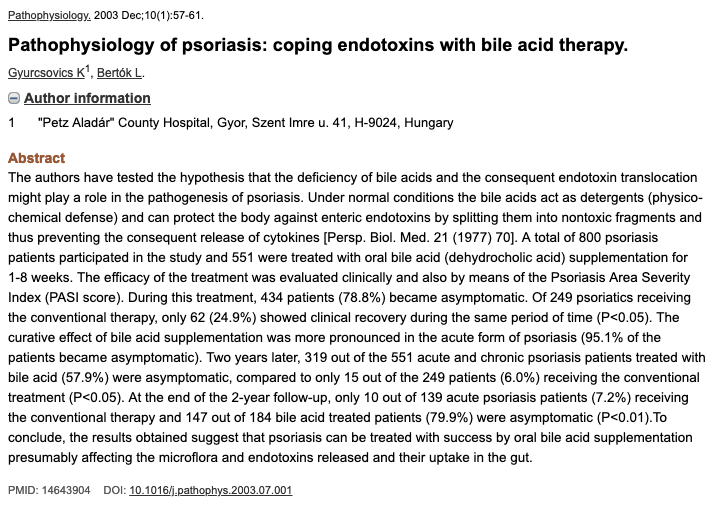
Bile acids clear the intestine of bacterial endotoxin so that the endotoxin can't get into the blood and skin. Here are some photos of patients under Dr. Ely's care before and after taking 500 mg ox bile extract with meals for a month:
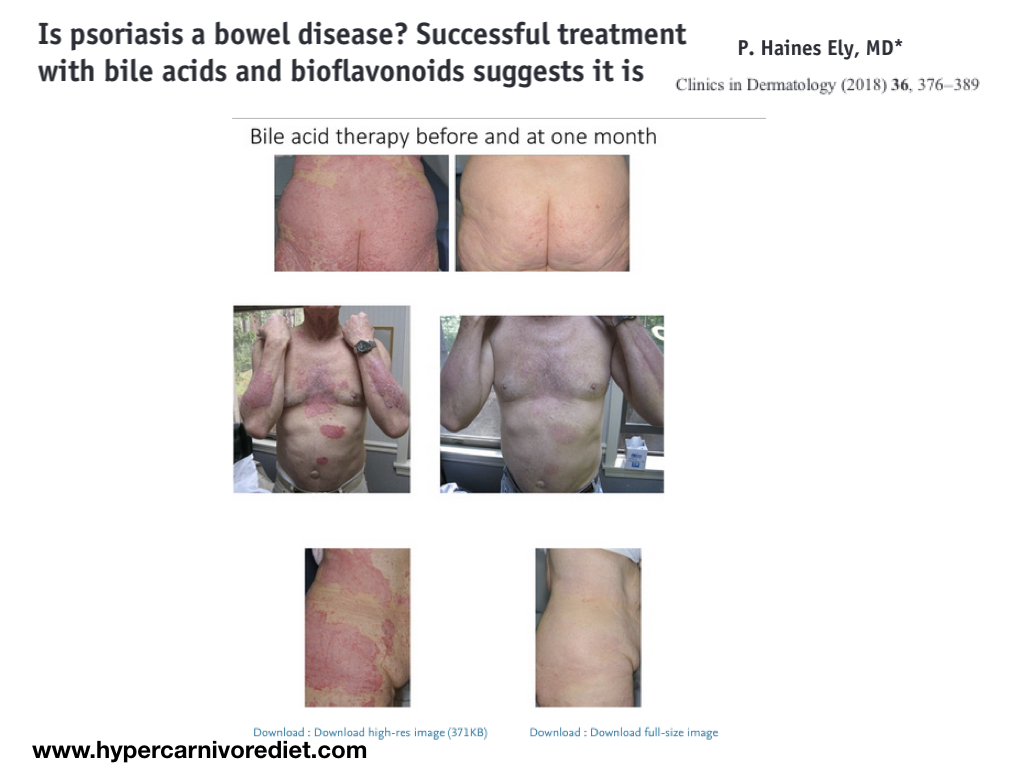
|
In this article Dr. Ely mentions having had success with the Allergy Research 500 mg ox bile supplement. I have used this myself (for 6 months at time of writing) and confirmed his report that the only side effect is diarrhea, which will pass as you adapt. I take a total of 1000-1500 mg daily. |
To improve endogenous bile formation and flow, I also take artichoke extract.
|
Artichoke extract was part of the program that helped me achieve the improvement in the psoriasis lesions in my ears, depicted in the photo above. Generally I take either artichoke extract or ox bile, but not both at the same time. For long term use I prefer the artichoke extract. I would recommend using the artichoke extract as a maintenance therapy after achieving results with the ox bile therapy. |
|
I also used milk thistle extract silymarin, which supports liver regeneration. I used a dose of 150 mg per meal. |
|
Dr. Ely also has his patients take S. boulardii because it can kill H. pylori and B. hominis bacteria that have been found present in psoriasis patients who have intense itching. I recommend the NOW or Jarrow brands. |
|
Curcumin suppresses phosphoryl kinase expression in psoriatic skin. The Meriva™ brand (to right) is best because most easily absorbed. Avoid any products containing black pepper extract because this increases intestinal permeability and endotoxin absorption, which you need to prevent. Dose is one capsule per meal. |
Fruit Bioflavonoids to Heal Psoriasis
|
Dr. Ely has his patients take 500 mg of quercetin (to right) with each meal because it blocks endotoxin absorption and also reduces skin cell proliferation like curcumin. |
|
I personally prefer to consume orange juice, grapes, or grape juice with my meals instead. Research shows that the bioflavonoids provided by these fruits block endotoxin absorption.1, 2, 3, 4 Orange juice richly provides the citrus bioflavonoid hesperidin, which inhibits the skin cell proliferation of psoriasis.5 If for some reason you don't want to use orange juice, you can take citrus bioflavonoids as a supplement. |
In addition these fruits provide valuable nutrients, including potassium, magnesium, and not least fructose, which helps to excrete excess phosphorus,6 which is over-concentrated in psoriasis skin.7, 8 Citrus fruits, grapes and many other juice-rich fruits are relatively poor sources of the fibers that promote intestinal bacteria overgrowth.
|
These photos show how the skin of my left ear (historically the worst of the two ears) has improved since I shifted to eating the Meats & Sweets High Vitality Diet (50-70% animal based plus fruits) while incorporating the supplements recommended in Dr. Ely's article: |
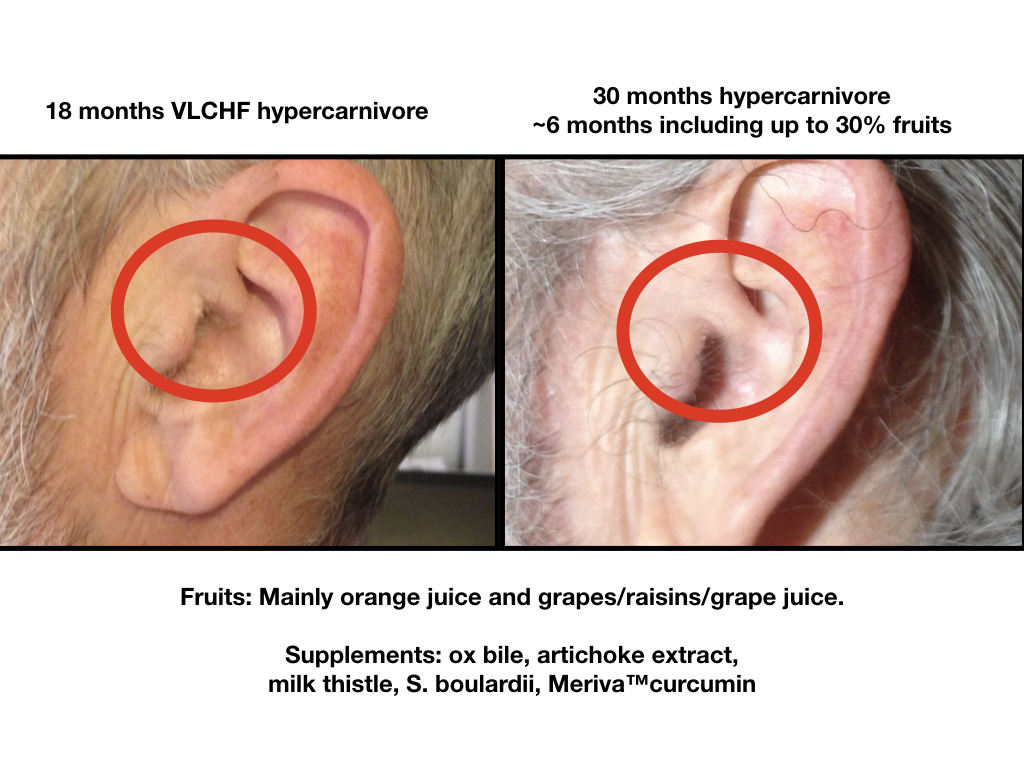
This ear (which as I mentioned has historically been the worst) is virtually 100% healed. This protocol has also resulted in reduced itching of my scalp lesions, indicating some healing occurring.
Low Salt for Psoriasis
Psoriasis is considered an autoimmune disease.
We now have evidence that high intake of salt may increase autoimmune activity by stimulating the activity of Th17 cells.9, 10 Psoriasis involves accumulation of immunostimulatory and Th1/Th17 cell polarizing myeloid dendritic cells.11
Finally, psoriasis patients have higher levels of sodium in affected skin than in unaffected tissues or skin of controls who do not have psoriasis.12
A potassium-rich diet with a high potassium:sodium ratio provides the antidote to this harmful accumulation of sodium in the body. Sodium accumulates when the body does not get enough potassium.
There is good reason to believe that our diets should provide at least 3-4 times as much potassium as sodium. Human and cow milk both provide 3-4 times as much potassium as sodium. Most meats provide 5-6 times as much potassium as sodium. Roots and fruits provide 10-50 times as much potassium as sodium. Eggs however have a 1:1 ratio.
When I learned of the need to correct this mineral imbalance to address my psoriasis, I stopped using almost completely, reduced my egg intake a little, started incorporating more winter squash (a type of fruit) and potatoes in my diet, to keep my potassium:sodium ratio above 5:1 most days. Sometimes I get a ratio around 10:1.
After this change my scalp psoriasis became much less itchy and less flakey, but the benefits went beyond my skin. Stopping salt also solved a problem I was having with cramping and evening lower limb edema, and improved my sleep and therefore my exercise recovery.
Vitamin D for Psoriasis
|
Vitamin D regulates skin cell proliferation and suppresses Th17-induced inflammation. Multiple studies have confirmed that vitamin D application or supplementation improves psoriasis.13 I have gotten the best results from doses greater than 4000 IU daily. As of December 18, 2021, I have taken 10,000-20,000 IU daily for months. |
Red Light Therapy for Psoriasis
I also use infrared and red light therapy for my skin. Red light has an anti-inflammatory action and has been found to improve psoriasis in a preliminary study.14 I use the MitoLight (affiliate link). Generally I expose my affected skin to the light for just 5 minutes daily. Red light therapy has other benefits I have discussed here.
Summary
In summary, the natural treatment plan I have used to heal psoriasis is:
1. A moderate fat, no-salt meat, dairy, fruits & roots diet. Include orange juice, dark grapes, or dark (concord) grape juice at each meal. I usually have 8-16 ounces of the fruit juices at each of 2 main meals.
2. Vitamin D, 5,000 IU+ daily
3. Ox bile, 500 mg per meal or artichoke extract, 450 mg per meal.
4. Milk thistle extract (silymarin), 150 mg per meal.
5. S. boulardii, 1 capsule 1-2 times daily.
6. Meriva™ curcumin, 500 mg at each meal.
7. Quercetin or citrus bioflavonoids, 500 mg at each meal if not including orange juice or grape juice in the meal.
8. Red light therapy, 5 minutes daily on each affected region.
Notes
1. Deopurkar R, Ghanim H, Friedman J, et al. Differential effects of cream, glucose, and orange juice on inflammation, endotoxin, and the expression of Toll-like receptor-4 and suppressor of cytokine signaling-3. Diabetes Care. 2010;33(5):991–997. doi:10.2337/dc09-1630. <https://www.ncbi.nlm.nih.gov/pmc/articles/PMC2858203/>
2. Ghanim H, Sia CL, Upadhyay M, et al. Orange juice neutralizes the proinflammatory effect of a high-fat, high-carbohydrate meal and prevents endotoxin increase and Toll-like receptor expression [published correction appears in Am J Clin Nutr. 2011 Mar;93(3):674. Upadhyay, Mannish [corrected to Upadhyay, Manish]]. Am J Clin Nutr. 2010;91(4):940–949. doi:10.3945/ajcn.2009.28584 <https://www.ncbi.nlm.nih.gov/pmc/articles/PMC2844681/>
3. Ghanim H, Sia CL, Korzeniewski K, et al. A resveratrol and polyphenol preparation suppresses oxidative and inflammatory stress response to a high-fat, high-carbohydrate meal. J Clin Endocrinol Metab. 2011;96(5):1409–1414. doi:10.1210/jc.2010-1812. <https://www.ncbi.nlm.nih.gov/pmc/articles/PMC3085195/>
4. Oliveira ALB, Monteiro VVS, Navegantes-Lima KC, et al. Resveratrol Role in Autoimmune Disease-A Mini-Review. Nutrients. 2017;9(12):1306. Published 2017 Dec 1. doi:10.3390/nu9121306. <https://www.ncbi.nlm.nih.gov/pmc/articles/PMC5748756/>
5. Li X, Xie X, Zhang L, et al. Hesperidin inhibits keratinocyte proliferation and imiquimod-induced psoriasis-like dermatitis via the IRS-1/ERK1/2 pathway. Life Sci 2019 Feb 15;219:311-321. doi: 10.1016/j.lfs.2019.01.019.
6. Milne DB, Nielsen FH. The interaction between dietary fructose and magnesium adversely affects macromineral homeostasis in men. J Am Coll Nutr. 2000 Feb;19(1):31-7. PubMed PMID: 10682873. <https://www.ncbi.nlm.nih.gov/pubmed/10682873>
7. Burkhart, C., & Burnham, J.. Elevated phosphorus in psoriatic skin determined by energy dispersive x‐ray micro‐analysis. Journal of Cutaneous Pathology 1983;10(3):171-77.
8. Hajini, G., Hussain, S., & Shah, S. Sodium, potassium and phosphorus content of normal and psoriatic skin. British Journal of Dermatology 1976;95(6):674-5.
9. Markus Kleinewietfeld, Arndt Manzel, Chuan Wu, Jens Titze, Vijay Kuchroo, Ralf Linker, Dominik Muller and David HaÓer; High salt induces pathogenic Th17 cells and exacerbates autoimmune diseases ( 60. 13) J Immunol May 1, 2012, 188
10. Markus Kleinewietfeld, Arndt Manzel, Jens Titze, Heda Kvakan, Nir Yosef, Ralf A. Linker, Dominik N. Muller, David A. Hafler; Sodium Chloride Drives Autoimmune Disease by the Induction of Pathogenic Th17 Cells.Nature. 2013 April 25; 496(7446): 518–522. doi:10.1038/nature11868.NIH
11. Zaba LC, Fuentes-Duculan J, Eungdamrong NJ, et al. Psoriasis is characterized by accumulation of immunostimulatory and Th1/Th17 cell-polarizing myeloid dendritic cells. J Invest Dermatol. 2009;129(1):79-88. doi:10.1038/jid.2008.194. <https://www.ncbi.nlm.nih.gov/pmc/articles/PMC2701224/>
12. Maifeld A, Wild J, Karlsen TV, et al. Skin Sodium Accumulates in Psoriasis and Reflects Disease Severity. J Invest Dermatol. 2021 Jul 6:S0022-202X(21)01423-8. doi: 10.1016/j.jid.2021.06.013. Epub ahead of print. PMID: 34237339.
13. Barrea L, Savanelli MC, Di Somma C, et al. Vitamin D and its role in psoriasis: An overview of the dermatologist and nutritionist. Rev Endocr Metab Disord. 2017;18(2):195-205. doi:10.1007/s11154-017-9411-6
Recent Articles
-
Ancient Roman Soldier Diet
Apr 14, 25 05:19 PM
A discussion of the ancient Roman soldier diet, its staple foods and nutritional value, and a vegan minimalist version. -
High Protein Chocolate Tofu Pudding
Jul 01, 24 12:41 PM
A delicious high protein chocolate tofu pudding. -
Vegan Macrobiotic Diet For Psoriasis
Sep 05, 23 06:36 PM
Vegan macrobiotic diet for psoriasis. My progress healing psoriasis with a vegan macrobiotic diet. -
How Every Disease Develops
Aug 04, 23 06:22 PM
How every disease develops over time, according to macrobiotic medicine. -
Why Do People Quit Being Vegan?
Jun 28, 23 08:04 PM
Why do people quit being vegan? How peer pressure and ego conspire against vegans. -
Powered By Plants
Mar 16, 23 08:01 PM
Powered By Plants is a book in which I have presented a lot of scientific evidence that humans are designed by Nature for a whole foods plant-based diet. -
Carnism Versus Libertarianism
Dec 30, 22 01:55 PM
Carnism Versus Libertarianism is an e-book demonstrating that carnism is in principle incompatible with libertarianism, voluntaryism, and anarchism. -
The Most Dangerous Superstition Book Review
Nov 15, 22 08:46 PM
Review of the book The Most Dangerous Superstition by Larken Rose.

